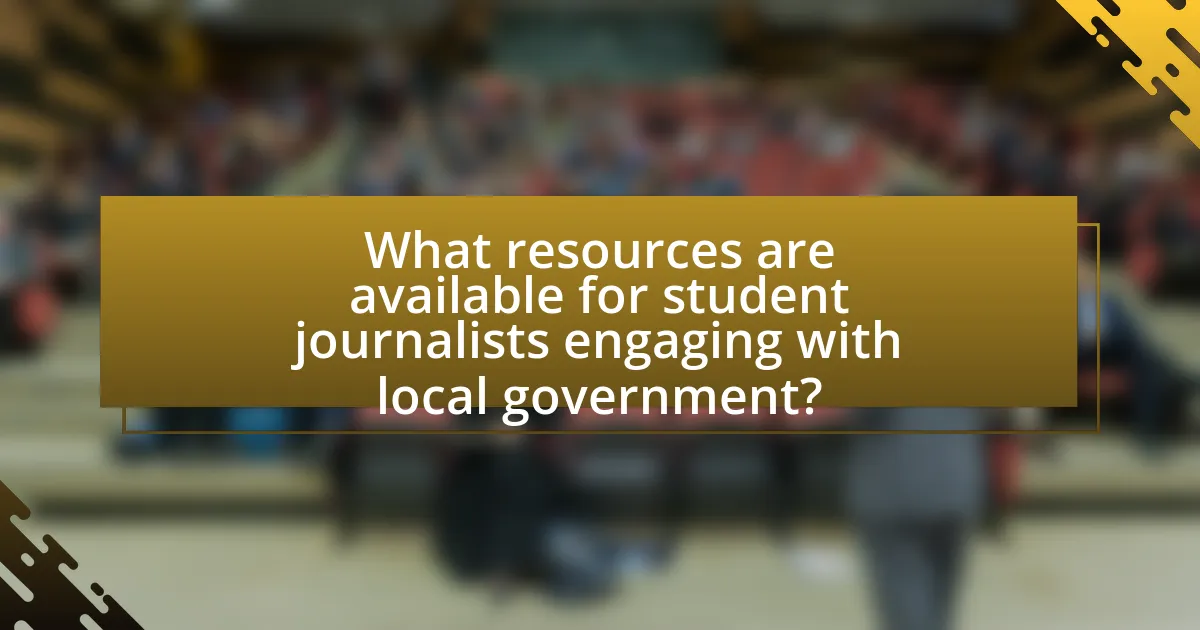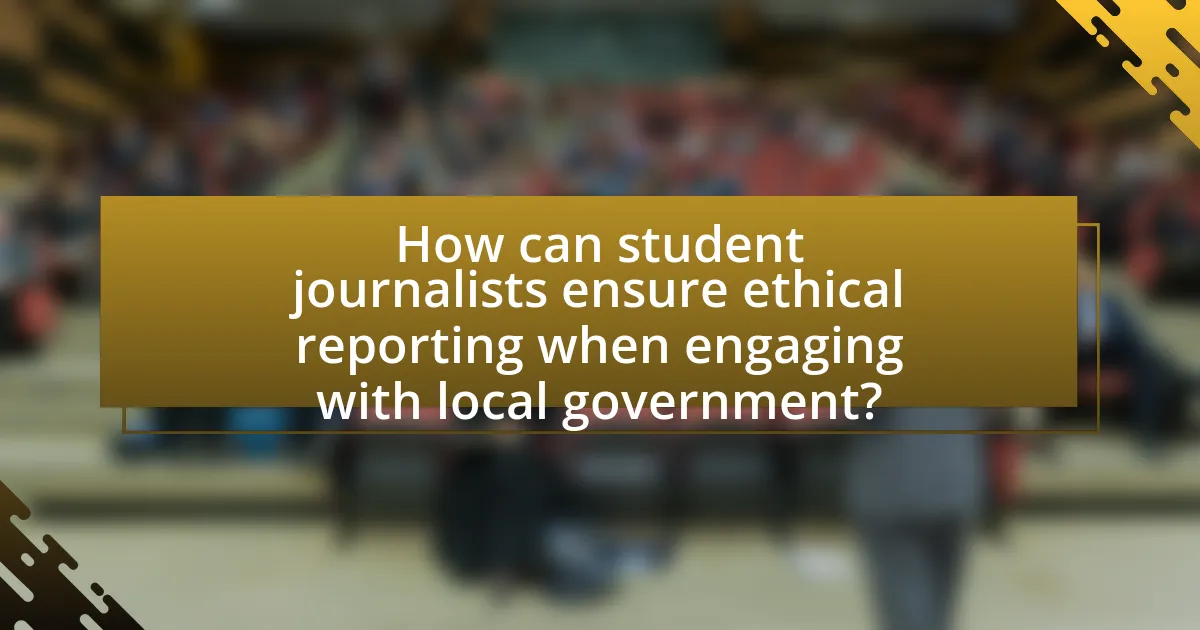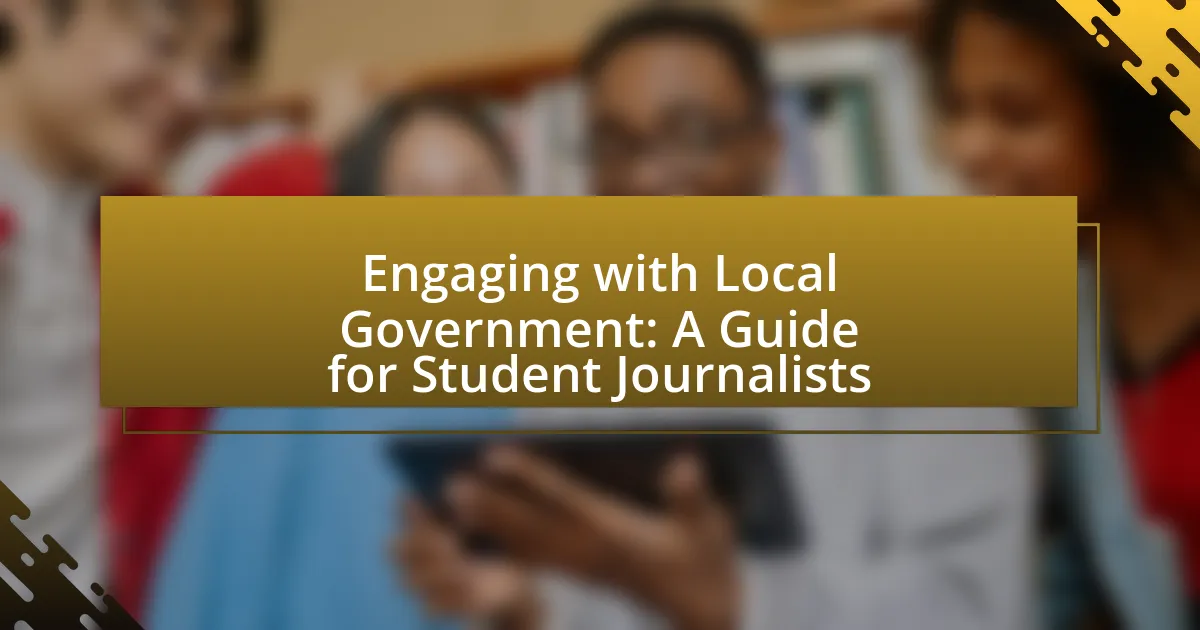Engaging with local government is a critical aspect for student journalists, as it involves reporting on municipal actions, policies, and community issues. This article outlines the importance of such engagement, highlighting opportunities for firsthand reporting, access to public records, and networking with local officials. It also addresses the challenges student journalists face, including limited access to information and potential pushback from officials, while providing strategies to overcome these obstacles. Additionally, the article emphasizes ethical reporting practices and the resources available to support student journalists in their local government coverage.

What does it mean to engage with local government as a student journalist?
Engaging with local government as a student journalist means actively reporting on, analyzing, and communicating the actions, policies, and issues that affect the community at the municipal level. This engagement involves attending city council meetings, interviewing local officials, and investigating community concerns to provide accurate and timely information to the public. By doing so, student journalists contribute to transparency and accountability in local governance, fostering informed citizen participation. For instance, a study by the Pew Research Center highlights that local news coverage significantly influences civic engagement, demonstrating the importance of student journalists in shaping public discourse around local government activities.
Why is engagement with local government important for student journalists?
Engagement with local government is important for student journalists because it provides them with firsthand access to information, decision-making processes, and community issues. By interacting with local officials, student journalists can uncover stories that impact their communities, ensuring accurate and relevant reporting. This engagement fosters transparency and accountability in governance, as student journalists can question policies and decisions directly. Furthermore, studies show that local news coverage significantly influences civic engagement; thus, student journalists play a crucial role in informing their peers and promoting active participation in local democracy.
What opportunities does local government engagement provide for student journalists?
Local government engagement provides student journalists with opportunities for firsthand reporting, access to public records, and networking with officials. By attending local government meetings, student journalists can gather information directly from decision-makers, enhancing their reporting accuracy and depth. Access to public records, such as meeting minutes and budgets, allows them to investigate and analyze local issues critically. Additionally, networking with local officials can lead to mentorship opportunities and insights into the workings of government, which are invaluable for developing their journalistic skills and understanding civic processes.
How can local government engagement enhance journalistic skills?
Local government engagement can enhance journalistic skills by providing firsthand access to information, fostering critical thinking, and improving communication abilities. When student journalists interact with local government officials, they gain insights into the decision-making processes and policy implications, which sharpens their investigative skills. For instance, attending town hall meetings allows journalists to ask questions directly, leading to a deeper understanding of community issues. Additionally, covering local government stories requires journalists to analyze complex data and articulate findings clearly, thus honing their writing and reporting skills. Engaging with local government also encourages networking opportunities, which can lead to mentorship and professional growth in the field of journalism.
What are the key components of local government that student journalists should understand?
The key components of local government that student journalists should understand include the structure, functions, and processes of local governance. Local government typically consists of elected officials, such as mayors and council members, who make decisions on community issues, manage budgets, and oversee public services. Understanding the roles of various departments, such as public safety, public works, and community development, is essential for journalists to accurately report on local matters. Additionally, knowledge of local laws, ordinances, and the budgeting process is crucial, as these elements directly impact community resources and services. Familiarity with public meetings, transparency requirements, and citizen engagement practices further equips student journalists to effectively cover local government activities and hold officials accountable.
What roles do local government officials play in the community?
Local government officials play crucial roles in the community by making decisions that affect local policies, services, and resources. They are responsible for implementing laws, managing public services such as education, transportation, and public safety, and engaging with residents to address their needs and concerns. For instance, mayors and city council members often hold public meetings to gather community input, ensuring that local governance reflects the population’s priorities. Additionally, local officials oversee budget allocations, which directly impact community development projects and social services, thereby shaping the quality of life for residents.
How does local government structure impact reporting?
Local government structure significantly impacts reporting by determining the flow of information and the accessibility of officials to journalists. In a decentralized structure, such as a council-manager system, reporters may find it easier to obtain information from various departments, as responsibilities are distributed among multiple officials. Conversely, in a centralized structure, like a mayor-council system, information may be more tightly controlled, limiting access to key decision-makers. This variation affects the depth and breadth of reporting, as journalists must navigate different levels of bureaucracy and communication channels to gather accurate information. For instance, a study by the Pew Research Center indicates that local government transparency directly correlates with the effectiveness of local journalism, highlighting how structural differences can influence the quality of reporting.
What challenges do student journalists face when engaging with local government?
Student journalists face several challenges when engaging with local government, including limited access to information, lack of experience, and potential pushback from officials. Limited access to information often arises from bureaucratic barriers, where public records may not be readily available or are difficult to obtain, hindering thorough reporting. Additionally, student journalists may lack the experience necessary to navigate complex governmental structures and processes, which can lead to misunderstandings or missed opportunities for coverage. Furthermore, local government officials may be resistant to student inquiries, viewing them as less credible or serious than established media, which can result in uncooperative attitudes or refusal to provide information. These challenges collectively impede the ability of student journalists to effectively report on local governance issues.
What barriers exist in accessing local government information?
Barriers in accessing local government information include lack of transparency, complex bureaucratic processes, and inadequate digital infrastructure. Lack of transparency often results from insufficient public communication strategies, making it difficult for citizens to obtain necessary information. Complex bureaucratic processes can hinder access by requiring extensive paperwork or navigating multiple departments, which can be time-consuming and confusing. Additionally, inadequate digital infrastructure, particularly in rural areas, limits access to online resources and information, further complicating the ability to engage with local government effectively. These barriers collectively impede informed citizen participation in local governance.
How can student journalists overcome these challenges?
Student journalists can overcome challenges by actively building relationships with local government officials and utilizing digital tools for effective communication. Establishing connections through networking events, attending public meetings, and engaging in community forums allows student journalists to gain insights and access to information. Additionally, leveraging social media platforms and online databases can enhance their ability to gather data and disseminate news quickly. Research indicates that student journalists who engage directly with local government sources report higher accuracy in their reporting, as they can verify information firsthand and clarify any misunderstandings.
How can student journalists effectively engage with local government?
Student journalists can effectively engage with local government by attending public meetings, such as city council sessions, to gather firsthand information and ask questions. This direct involvement allows them to understand local issues, policies, and community concerns. Additionally, building relationships with local officials through interviews and networking can enhance their access to information and insights. Research indicates that consistent engagement with local government entities fosters transparency and accountability, which are essential for informed reporting. By actively participating in the civic process, student journalists can contribute to a more informed public discourse.
What strategies can enhance communication with local government officials?
To enhance communication with local government officials, student journalists should employ strategies such as establishing regular contact, utilizing clear and concise messaging, and actively engaging in community meetings. Regular contact fosters relationships, making officials more approachable and responsive. Clear messaging ensures that the information conveyed is easily understood, reducing the chances of miscommunication. Engaging in community meetings allows journalists to gain insights into local issues and demonstrate their commitment to the community, which can lead to more open lines of communication. These strategies are effective as they build trust and rapport, essential elements in fostering productive interactions with government officials.
How can student journalists prepare for meetings with local government representatives?
Student journalists can prepare for meetings with local government representatives by conducting thorough research on the officials, their policies, and current local issues. This preparation includes reviewing recent news articles, official government websites, and public records to understand the context of the meeting. Additionally, formulating specific questions related to local governance and community concerns can help guide the discussion. Practicing active listening and note-taking during the meeting ensures that important information is captured accurately. Engaging with local government representatives effectively requires a clear understanding of the topics at hand and the ability to communicate relevant inquiries.
What questions should student journalists ask during interviews with local officials?
Student journalists should ask local officials questions that cover key areas such as policy decisions, community impact, budget allocations, and future plans. For example, they can inquire about the rationale behind recent policy changes, how those changes will affect the local community, and what measures are being taken to address community concerns. Additionally, questions about the allocation of budget resources and how they align with community needs are crucial. These inquiries help ensure transparency and accountability in local governance, which is essential for informed reporting.

What resources are available for student journalists engaging with local government?
Student journalists engaging with local government can access various resources, including online databases, local government websites, and journalism organizations. Online databases like the National Freedom of Information Coalition provide information on public records and transparency laws, which are crucial for investigative reporting. Local government websites often contain meeting minutes, agendas, and contact information for officials, enabling students to gather relevant information and connect with sources. Additionally, organizations such as the Society of Professional Journalists offer training, workshops, and guidelines specifically tailored for journalists covering local issues, enhancing their skills and understanding of the local governance landscape.
What tools can assist student journalists in their research on local government?
Student journalists can utilize various tools to assist in their research on local government, including public records databases, social media platforms, and data visualization software. Public records databases, such as local government websites and state open records portals, provide access to essential documents like meeting minutes, budgets, and ordinances, which are crucial for understanding government operations. Social media platforms, including Twitter and Facebook, allow journalists to engage with local officials and the community, facilitating real-time updates and public sentiment analysis. Data visualization software, such as Tableau or Google Data Studio, helps journalists present complex data in an accessible format, making it easier to convey findings to their audience. These tools collectively enhance the research capabilities of student journalists, enabling them to produce informed and impactful stories about local government.
How can online databases and public records be utilized?
Online databases and public records can be utilized by student journalists to access vital information about local government activities, decisions, and public services. These resources provide transparency and accountability, allowing journalists to investigate issues such as budget allocations, public meeting minutes, and local ordinances. For instance, the Freedom of Information Act (FOIA) enables access to federal agency records, while many states have similar laws for state and local records. By leveraging these databases, student journalists can uncover stories that impact their communities, ensuring informed reporting and civic engagement.
What role do local news organizations play in supporting student journalists?
Local news organizations play a crucial role in supporting student journalists by providing mentorship, resources, and platforms for their work. These organizations often collaborate with educational institutions to offer internships, workshops, and training sessions that enhance the skills of student journalists. For instance, many local news outlets have established partnerships with schools to facilitate real-world reporting experiences, allowing students to cover local events and issues. This engagement not only helps students develop their journalistic abilities but also fosters a sense of community involvement and awareness of local governance.
What training opportunities exist for student journalists interested in local government reporting?
Student journalists interested in local government reporting can access various training opportunities, including workshops, internships, and specialized courses. Organizations such as the National Press Foundation and the Investigative Reporters and Editors offer workshops focused on local government reporting techniques, while universities often provide courses in public affairs reporting. Internships with local news outlets or government agencies also provide hands-on experience. According to the American Journalism Review, practical experience through these avenues significantly enhances a journalist’s ability to cover local government effectively.
How can workshops and seminars improve skills in local government journalism?
Workshops and seminars can significantly enhance skills in local government journalism by providing targeted training and practical experience. These events often feature expert speakers who share insights on reporting techniques, legal considerations, and ethical standards specific to local governance. For instance, a study by the Pew Research Center found that journalists who participate in professional development programs report increased confidence and improved reporting skills. Additionally, hands-on activities during these workshops allow participants to practice interviewing public officials and writing news articles, which directly translates to better job performance in real-world scenarios.
What mentorship programs are available for aspiring student journalists?
Aspiring student journalists can participate in mentorship programs such as the National Scholastic Press Association’s mentorship initiative, which connects students with experienced journalists for guidance and support. Additionally, the Online News Association offers a Student Newsroom program that provides mentorship opportunities during major journalism events. These programs are designed to enhance skills, provide networking opportunities, and offer real-world insights into the journalism field, thereby fostering the development of future journalists.

How can student journalists ensure ethical reporting when engaging with local government?
Student journalists can ensure ethical reporting when engaging with local government by adhering to principles of transparency, accuracy, and fairness. Transparency involves disclosing any potential conflicts of interest and being open about the sources of information. Accuracy requires verifying facts through multiple reliable sources, as evidenced by the Society of Professional Journalists’ Code of Ethics, which emphasizes the importance of truthfulness. Fairness entails providing balanced coverage that represents diverse viewpoints, ensuring that all relevant voices are heard, which is crucial in fostering trust within the community.
What ethical considerations should student journalists keep in mind?
Student journalists should prioritize accuracy, fairness, and transparency in their reporting. Accuracy ensures that the information presented is correct and reliable, which is essential for maintaining credibility. Fairness involves representing all sides of a story, allowing for balanced perspectives, which is crucial in fostering trust with the audience. Transparency requires journalists to disclose their sources and any potential conflicts of interest, thereby promoting accountability. These ethical considerations are supported by the Society of Professional Journalists’ Code of Ethics, which emphasizes the importance of these principles in fostering responsible journalism.
How can transparency and accountability be maintained in reporting?
Transparency and accountability in reporting can be maintained by implementing rigorous fact-checking processes and adhering to ethical journalism standards. Fact-checking ensures that all information presented is accurate and verifiable, which builds trust with the audience. Ethical journalism standards, such as those outlined by the Society of Professional Journalists, emphasize the importance of honesty, fairness, and integrity in reporting. By consistently applying these principles, journalists can hold themselves accountable to their audience and the subjects of their reporting, fostering a culture of transparency.
What are the best practices for sourcing information from local government?
The best practices for sourcing information from local government include establishing direct communication with officials, utilizing official websites and public records, attending public meetings, and leveraging local government transparency initiatives. Direct communication with officials, such as city council members or department heads, allows for accurate and timely information. Official websites often provide access to documents, reports, and data that are essential for research. Attending public meetings, such as town halls or council sessions, offers firsthand insights and opportunities to ask questions. Additionally, many local governments have transparency initiatives that publish budgets, spending reports, and other relevant data, which can be invaluable for journalists seeking factual information.
What are the common pitfalls to avoid when reporting on local government?
Common pitfalls to avoid when reporting on local government include failing to verify facts, lacking context, and not understanding local issues. Journalists often overlook the importance of fact-checking, which can lead to the dissemination of misinformation; for instance, a study by the Pew Research Center found that 64% of Americans believe that misinformation has caused confusion about basic facts. Additionally, reporters may provide insufficient context, which can mislead the audience about the significance of local government actions. Understanding local issues is crucial, as a lack of familiarity can result in superficial reporting that does not address community concerns.
How can bias be minimized in local government reporting?
Bias can be minimized in local government reporting by implementing diverse sourcing, fact-checking, and transparency in reporting processes. Diverse sourcing involves gathering information from a wide range of stakeholders, including community members, experts, and officials, which helps to present multiple perspectives and reduce the influence of any single viewpoint. Fact-checking ensures that the information presented is accurate and reliable, thereby enhancing credibility. Transparency in reporting processes, such as disclosing potential conflicts of interest and the methodology used for gathering information, fosters trust and accountability. Studies have shown that diverse representation in news coverage leads to more balanced reporting, which supports the claim that these practices effectively reduce bias.
What steps can be taken to verify information from local officials?
To verify information from local officials, journalists should cross-check the information with multiple credible sources. This includes consulting official documents, such as meeting minutes or public records, and reaching out to independent experts or community organizations for their perspectives. Additionally, journalists can utilize fact-checking websites and databases that specialize in verifying claims made by public officials. Engaging directly with the community through interviews can also provide context and corroborate the information received from officials. These steps ensure accuracy and accountability in reporting, as supported by the principles outlined in the Society of Professional Journalists’ Code of Ethics, which emphasizes the importance of seeking truth and reporting it.
What practical tips can help student journalists succeed in local government engagement?
Student journalists can succeed in local government engagement by actively attending public meetings, such as city council sessions, to gain firsthand insights into local issues. Engaging directly with local officials and community members during these meetings fosters relationships and provides valuable context for reporting. Additionally, researching local government structures and processes enhances understanding, allowing journalists to ask informed questions and produce accurate stories. Utilizing social media platforms to share findings and connect with the community can amplify their reach and impact. These strategies are supported by the National Scholastic Press Association, which emphasizes the importance of direct engagement and informed reporting in local journalism.

Leave a Reply